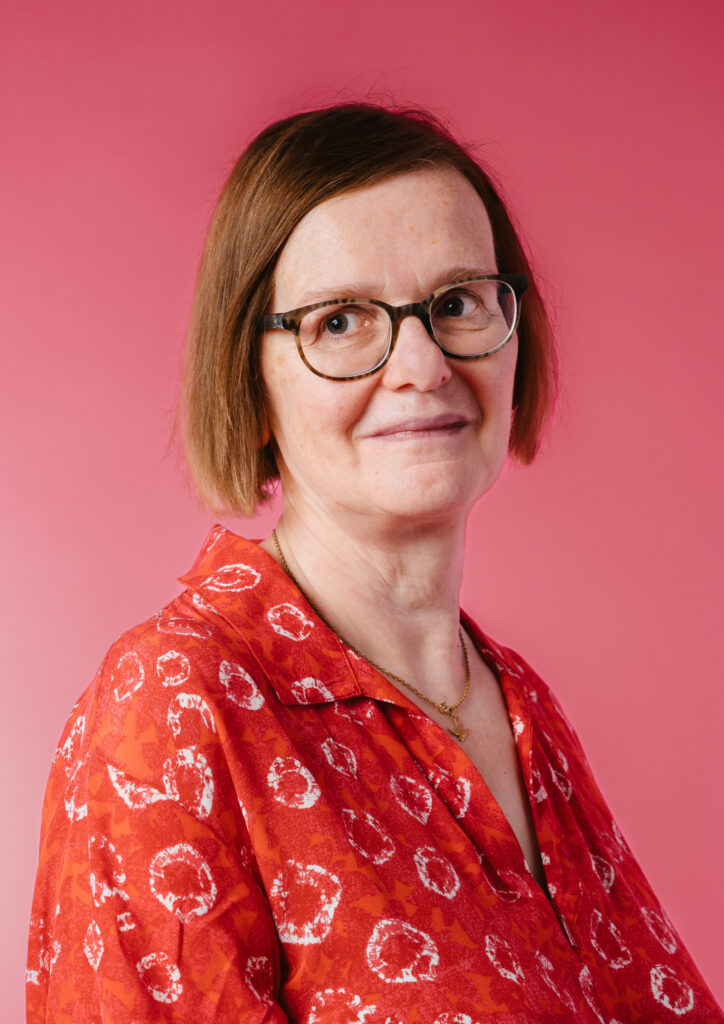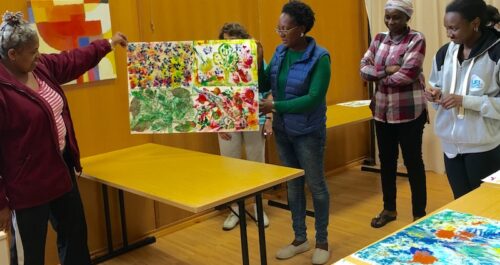

Rosemary Stott
Audio Player
Int – Interviewer
RS – Rosemary Stott
Int: Tell us about yourself
RS: My name is Rosemary Stott and I am the Dean of the School of Creative Arts and Industries at University of East London and I’ve been there for 3.5 years, but I’m quite new to the role of Dean of School, so I started this academic year so really 6 months in post
Int: Can you tell us a little bit about your connection to Rosetta Arts?
RS: So, shortly after starting my role at University of Est London, which was in March 2020, I often joke, that I arrived with the pandemic. So within my first week I was asked to come over to Rosetta Arts to talk to a group of people there led by Sanaz Amidi to the discuss a bid to Arts Council England for a project of a Creative People and Places bid for Newham. Literally within my first week, I came over here. I had never been here before. I got to know Sanaz herself nd got to know various members of the cultural community in Newham as well as other leaders in the creative arts area from Royal Docks Enterprise Zone, from New Council itself and so on and we had a very interesting day’s meeting. I seem to remember developing ideas for the bid and it was about to be put in ,so I wouldn’t say we were developing the ideas , but I think it was actually quite late on in the process that I joined, but it was all very empowering and felt really engaged to privilege to be part of that process, however, because of the pandemic the submission of the bid got delayed. Then when there was a re-submission of the bid, I got involved again and through that, made loads of connections in that group. I was really encouraged or yeah very keen to become part of the creative new association that came out of that bid and really led the bid and then of course when it was successful, that was really exciting as well that was December 2021, so throughout that it was all work with Rosetta and the team at wider team that have been part of that bid, but as a result of that just got more involved and got to know what Rosetta do, but for the institution itself. That’s my personal story of Rosetta, but for the University of East London, the history goes right back to the beginning, so when Rosetta was founded in 1973 UEL, was a partner in its being founded so my University of East London, has been around for 125 years and Rosetta arts have been around for 30 years and we’ve been on that journey as an institution and as a university the whole time, so obviously you know my predecessors in the role and obviously arts at the University of East London has been central throughout our history.
So when Rosetta was founded in 1973 UEL was a partner in it being founded so my University of East London has been around for 125 years and Rosetta arts have been around for 30 years and we’ve been on that journey as an institution and as a university of the whole time so obviously you know my predecessors in the role and obviously arts at the University of East London has been central to the history. I was fascinated to see some original maps and drawings of the founding The University of East London from 1898 which clearly shows that the arts and art was already part of the curriculum in 1898. I’m really proud to be the inheritor of the importance of the arts here in Newham through that University journey – which then gave birth,in a way, to Rosetta and that partnership between us has been going on for those 30 years.
so that’s really, really amazing. I myself, I’m a film historian, but I love history of the people, so at school I didn’t even do GCSE history because it’s all about kings and queens and elites and it
just didn’t relate to it then later on in life. I realised actually history can be about communities it can be about women ,that can be about migration, obvious things that I’m interested in and so you know, I’m knocking some history. On the 7th of September, 30th anniversary of Rosetta Arts immediately, that’s my way in and I think for me this wonderful Victorian building just like UEL in our Stratford campus our original Victorian building with all the architectural detail from the beginning still intact to me that speaks for the history of the communities the people who’ve come through those buildings, and of course, at the heart of both institutions, is education and how wonderful is that you know, I feel myself privileged to being an educator for over 30 years now and to have given generations Of art students opportunities to grow and develop through the arts and to have careers in creative art. How wonderful is that!
I feel a real connection with Rossetta who have been doing that with us and unlocking all the amazing creativity in Newham. You don’t need to teach people creativity in Newham, its there through all the diversity, you know, it would be patronising to say you need, you know, our Eurocentric creativity or whatever kind of creativity when that’s all there, and a lot of those communities are much more connected to creativity and to culture than, you know, white British people are in Newham because they kept those cultures that’s keeping the communities together. You think of music, for example, we have music at UEL. I’m not sure you have much music at Rosetta Arts, but for me that is just one example of a cultural strength that we can really bring out through the work that we do together. So our program of the Arts Council England Creative People and Places Projects which is called Culture within Newham, that’s exactly what we’re doing. We’re empowering those communities to create the culture that they want. We’re not coming to them, you know, saying get involved in this workshop. We’re saying you develop that workshop, you bring that culture to the fore that means so much to your world, and that can be anything. Culture is a very broad definition isn’t it. It can be from food, from religions through to the more conventional arts that we associate with Rosetta as we sitting in this room with paintings around us enjoying wonderful artwork that people have done, but there’s many ways that we can express ourselves creatively.
Int: What changes have taken place?
RS: Rosetta Arts, as I said, has been connected with UEL for many years, but I think well, I’d say the trajectory is much more engagement, much closer engagement so connection to things that we’ve been doing for many years, like Art Matters which is an exhibition that’s held within our Docklands campus at University of East London, but very much is about schools and the community and art in the community and Rosetta Arts are very much a part of that initiative. So I’d say those things are been going, but we’re growing new ideas new, ways of working together so Creative People and Places is one year old now, so that’s culture within Newham. That’s really got off the ground this year and that was born from creative Newham which was founded by Rosetta effectively or Sanaz Amidi herself, so that’s been really extending the relationship growing power of the arts within the community and I can see that going up as we get to know each other more we create connections, we together we can co-create experiences and arts projects and exhibitions and shows as well as local-based community arts projects. So I think it’s all about growth and unlocking at that potential, raising the profile, making it more visible and Newham is on the up in terms of the art. I’d say in terms of unlocking. My feeling is as I mentioned before, the arts has always been there and this excellence is there the vibrancy and the community diversity of cultural expression. It’s so exciting and it’s what makes Newham and fantastic place to work and live. So I think it’s just about bringing that to the fore and getting the message out there and raising the quality of people’s lives through the arts and that definitely is getting stronger and stronger. Let’s say our community is strong. We don’t want it to be ignored. We want it to come to the fore. For me that’s the future vision as well

